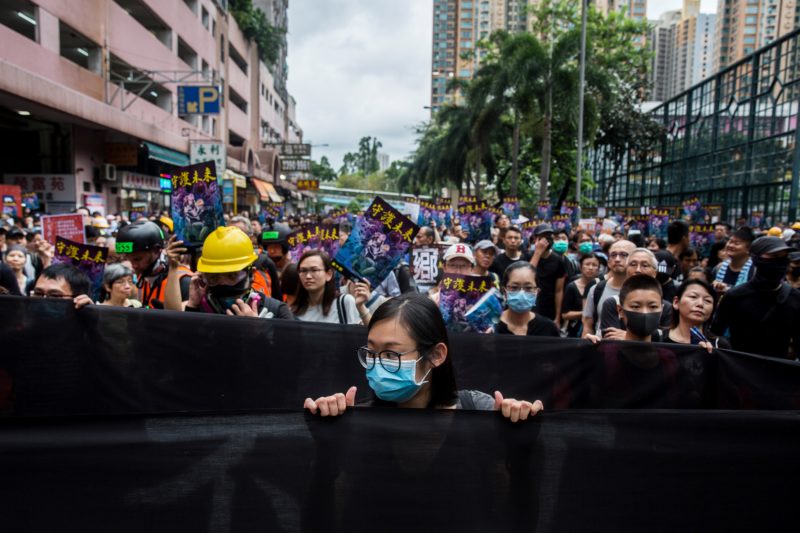Hong Kong pro-democracy ‘sins’ fuel boycott calls in China
The boycott campaigns have built over the past week alongside signs of growing anger by Chinese authorities against the protesters, who have relentlessly taken to the streets for more than two months demanding greater freedoms (Isaac LAWRENCE)
Beijing (AFP) – Companies are getting caught in the cross-fire of Hong Kong’s pro-democracy unrest, with Chinese state-run media inciting boycott campaigns against firms seen to be backing the protesters.
Hong Kong’s flagship airline, Cathay Pacific, has become one of the highest-profile targets, while a Taiwanese bubble tea franchise and a popular Japanese sports drink have also felt online fury.
A #BoycottCathayPacific thread on Chinese social media platform has attracted more than 17 million views and 8,000 comments, partly fuelled by articles from the powerful state-run press.
“The four sins of Cathay Pacific Airlines,” read a headline this week in the People’s Daily, the main mouthpiece of the ruling Communist Party, as it detailed actions by the carrier and its staff that were perceived as being supportive of the pro-democracy movement.
The boycott campaigns have built over the past week alongside signs of growing anger by Chinese authorities against the protesters, who have relentlessly taken to the streets for more than two months demanding greater freedoms.
When it took back control of Hong Kong from the British in 1997, China committed to giving the city a large degree of autonomy and allowing its residents far more liberties than those allowed on the mainland.
The protests have been fuelled by widespread anger at an erosion of these liberties, including freedom of speech, and a perceived reneging by Beijing of the “one country, two systems” legal framework for its rule of Hong Kong.
Echoing comments from officials, Chinese state media has ramped up rhetoric against the “radical” protests that have been organised by “violent criminals”.
– Bubble tea boycott –
Social media on the mainland, which sits behind a censorship ‘firewall’ and where freedom of speech is not tolerated, has in turn echoed state media.
“Although bubble tea is delicious, it is nothing compared to national sovereignty,” wrote one user on Weibo joining on online campaign against Taiwanese tea house Yifang.
“Starting today, I will boycott all bubble tea shops that support Hong Kong and Taiwan independence!”
“I will not buy it [bubble tea], even if I die of thirst!” posted another.
Global Times, one of the highest profile and most nationalistic state run media outlets, reported this week that the #bubbleteaboycott had attracted 230 million views on Weibo.
One of Yifang’s branches in Hong Kong had reportedly hung a sign cheering on the city’s pro-democracy protesters.
That shop in Hong Kong was later vandalised, according to Taiwanese broadcaster TVBS.
This in turn sparked a backlash in Taiwan, with some local shops on the self-governed island posting signs that said: “We cherish democracy and freedom”.
Cathay Pacific has become a target partly because some of its air crew have joined protests and media reported one of its pilots had been charged with rioting.
The airline’s flight attendants’ union put its name to a joint statement with other aviation industry employees on Monday backing the protesters.
“Over the last 50 days, the government has been ignoring the demands of the people and using only police force to try to suppress voices, causing countless Hong Kong people to despair,” said the statement, which was on the union’s Facebook page.
– ‘Disgraceful role’ –
In return, Cathay has endured a fierce backlash on the mainland.
“Cathay Pacific Airlines has repeatedly appeared in Hong Kong’s unrest, and plays a disgraceful role,” said a post published by the Communist Party Youth League on its official social media accounts.
Cathay Pacific chairman John Slosar on Wednesday defended his workforce and freedom of thought.
“We employ 27,000 staff in Hong Kong doing all sorts of different jobs,” Slosar said at a press conference following the release of company results which showed the protests had impacted passenger numbers in July.
“You would easily imagine that within that 27,000 we have virtually every opinion on every issue… we certainly wouldn’t dream of telling them what they have to think about something.”
Japanese sports drink Pocari Sweat also found itself caught uncomfortably in the middle of the unrest.
Pro-democracy demonstrators cheered Pocari Sweat after it pulled advertising from Hong Kong television station TVB, which protesters accuse of pro-Beijing coverage.
But facing boycott calls, the firm’s mainland China office subsequently issued a statement emphasising that it operated separately from the Hong Kong division and that it upheld the “one country, two systems” principle.
Disclaimer: Validity of the above story is for 7 Days from original date of publishing. Source: AFP.


